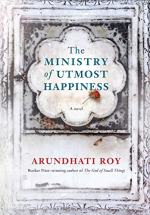|
This section contains 776 words (approx. 2 pages at 400 words per page) |

|
The Ministry of Utmost Happiness Summary & Study Guide Description
The Ministry of Utmost Happiness Summary & Study Guide includes comprehensive information and analysis to help you understand the book. This study guide contains the following sections:
This detailed literature summary also contains Quotes and a Free Quiz on The Ministry of Utmost Happiness by Arundhati Roy.
The following version of this book was used to create this study guide: Roy, Arundhati. The Ministry of Utmost Happiness. Knopf, 2017.
In her novel, The Ministry of Utmost Happiness, author Arundhati Roy uses multiple perspectives to tell a layered, multidimensional story that spans the Indian Subcontinent and multiple decades. The novel opens with Aftab, a hermaphrodite born in Old Delhi. When Aftab reaches puberty, he elects for gender reassignment surgery and becomes Anjum, a glamorous, affectionate woman. The 18-year-old Anjum then falls in with the residents of the so-called “Khwabgah,” meaning “House of Dreams.” Many of the residents of the Khwabgah are either hermaphrodites or transsexuals. Anjum remains with the Khwabgah for 30 years, during which time she raises a little girl named Zainab.
However, at the age of 46 years old, Anjum survives a massacre in Ahmedabad and leaves the Khabgah in order to move into a cemetery ten minutes away. There, Anjum transforms the cemetery into a guest house, called “Jannat” (or “Paradise”) Guest House, and creates Jannat Funeral Services. Jannat Guest House becomes home to other marginalized and persecuted characters like herself. One day, a baby is found at an old observatory in Delhi where various activists gather. Anjum falls in love with the child, and when she disappears, tracks the baby to the house of the woman who has taken her.
The narrative then shifts towards focusing on this woman, whose name is S. Tilottama—or “Tilo,” for short. Like Anjum’s story, Tilo’s story is told through the third-person. However, two of the men who loved her during their college days—an old bureaucrat nicknamed “Garson Hobart” and a mainstream journalist named Naga who becomes her husband—also provide their first-person account of the impression she made. Tilo is dark-skinned and intelligent; in university, she is close with an architecture student from Kashmir, named Musa Yeswi.
As the story unravels, the reader learns that Musa and Tilo reconnected after university and after the death of his wife Arifa and their daughter, Miss Jebeen. In the mid-to late-1990s, Musa becomes involved with the Kashmiri separatist, or freedom, movement that calls for the Muslim-majority region called Kashmir to break from Hindu-majority India. Musa and his friend, Commander Gulrez, attract the attention of Indian bureaucrats, including the vicious Major Amrik Singh who is known for his ruthless torture tactics. Although Musa escapes, Tilo is watching as they murder Gulrez. Upon her release, a shaken Tilo marries Naga for protection and security.
Fourteen years later, Tilo divorces Naga and rents an apartment from the old friend she knows as Garson Hobart. Initially excited by her reappearance in his life, “Garson Hobart” is dismayed to see that she has disappeared once again. It is revealed that Tilo is the woman who stole the baby from the observatory; she has given the baby the name, Miss Jebeen the Second, in honor of Musa’s slain daughter. Tilo is invited, and agrees, to go live with Anjum at the Jannat Guest House.
The narrative jumps back in time once again to give the full details of the deaths of Arifa and Miss Jebeen (the First). They are shot and killed by soldiers amid the violence of 1990s Kashmir. After their deaths, Amrik Singh tries to ply Musa with a gift, but he cannot be bought; he goes undercover. More details are given regarding the night on which Commander Gulrez dies, and it is revealed that when Tilo leaves Kashmir and marries Naga, she is pregnant with Musa’s child. She decides to terminate the pregnancy.
Back in the present, the residents of Jannat Guest House celebrate Zainab’s marriage to Saddam, a resident. One day, a letter arrives written by the mother of Miss Jebeen the Second. The mother, Comrade Maase Revathy, is a dedicated Communist. She conceived the child through rape. Although she cannot care for her, Revathy reveals in her letter that she named her daughter Udaya. The residents of Jannat Guest House agree to name the baby Miss Udaya Jebeen.
Meanwhile, the character known as Garson Hobart has been reading through Tilo’s many documents; he realizes that his opinions about Kashmir have changed. One day, Musa walks into Tilo’s apartment, where he is staying. The two talk, and Musa warns that, “One day Kashmir will make India self-destruct” (440). In the final chapter, Musa joins Tilo at Jannat Guest House for a night. Tilo eventually hears word that Musa has died in the fight for Kashmiri freedom. In the last scene, Anjum takes Miss Udaya Jebeen for a walk around Delhi while a small dung beetle watches over the world.
Read more from the Study Guide
|
This section contains 776 words (approx. 2 pages at 400 words per page) |

|



